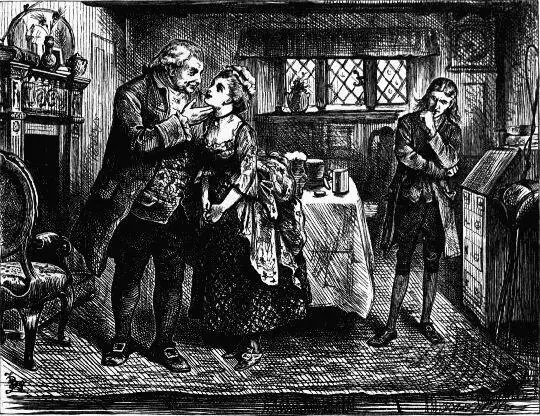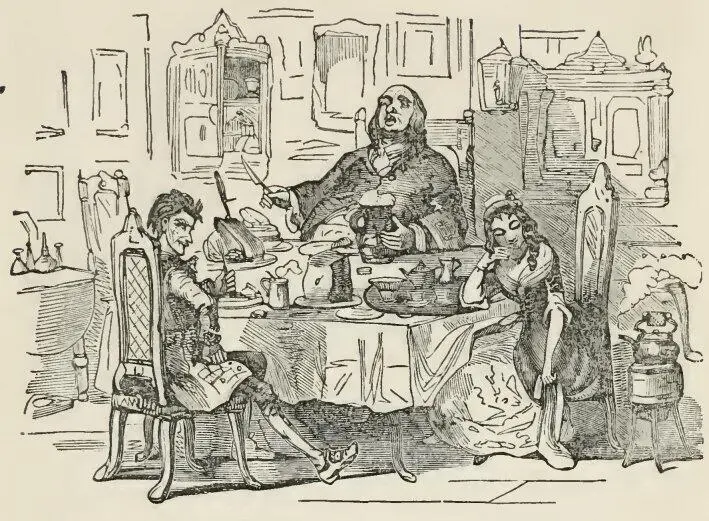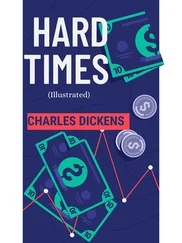In respect of dress and personal decoration, Sim Tappertit was no less of an adventurous and enterprising character. He had been seen, beyond dispute, to pull off ruffles of the finest quality at the corner of the street on Sunday nights, and to put them carefully in his pocket before returning home; and it was quite notorious that on all great holiday occasions it was his habit to exchange his plain steel knee-buckles for a pair of glittering paste, under cover of a friendly post, planted most conveniently in that same spot. Add to this that he was in years just twenty, in his looks much older, and in conceit at least two hundred; that he had no objection to be jested with, touching his admiration of his master’s daughter; and had even, when called upon at a certain obscure tavern to pledge the lady whom he honoured with his love, toasted, with many winks and leers, a fair creature whose Christian name, he said, began with a D—;—and as much is known of Sim Tappertit, who has by this time followed the locksmith in to breakfast, as is necessary to be known in making his acquaintance.
It was a substantial meal; for, over and above the ordinary tea equipage, the board creaked beneath the weight of a jolly round of beef, a ham of the first magnitude, and sundry towers of buttered Yorkshire cake, piled slice upon slice in most alluring order. There was also a goodly jug of well-browned clay, fashioned into the form of an old gentleman, not by any means unlike the locksmith, atop of whose bald head was a fine white froth answering to his wig, indicative, beyond dispute, of sparkling home-brewed ale. But, better far than fair home-brewed, or Yorkshire cake, or ham, or beef, or anything to eat or drink that earth or air or water can supply, there sat, presiding over all, the locksmith’s rosy daughter, before whose dark eyes even beef grew insignificant, and malt became as nothing.
Fathers should never kiss their daughters when young men are by. It’s too much. There are bounds to human endurance. So thought Sim Tappertit when Gabriel drew those rosy lips to his—those lips within Sim’s reach from day to day, and yet so far off. He had a respect for his master, but he wished the Yorkshire cake might choke him.

‘Father,’ said the locksmith’s daughter, when this salute was over, and they took their seats at table, ‘what is this I hear about last night?’
‘All true, my dear; true as the Gospel, Doll.’
‘Young Mr Chester robbed, and lying wounded in the road, when you came up!’
‘Ay—Mr Edward. And beside him, Barnaby, calling for help with all his might. It was well it happened as it did; for the road’s a lonely one, the hour was late, and, the night being cold, and poor Barnaby even less sensible than usual from surprise and fright, the young gentleman might have met his death in a very short time.’
‘I dread to think of it!’ cried his daughter with a shudder. ‘How did you know him?’
‘Know him!’ returned the locksmith. ‘I didn’t know him—how could I? I had never seen him, often as I had heard and spoken of him. I took him to Mrs Rudge’s; and she no sooner saw him than the truth came out.’
‘Miss Emma, father—If this news should reach her, enlarged upon as it is sure to be, she will go distracted.’
‘Why, lookye there again, how a man suffers for being good-natured,’ said the locksmith. ‘Miss Emma was with her uncle at the masquerade at Carlisle House, where she had gone, as the people at the Warren told me, sorely against her will. What does your blockhead father when he and Mrs Rudge have laid their heads together, but goes there when he ought to be abed, makes interest with his friend the doorkeeper, slips him on a mask and domino, and mixes with the masquers.’
‘And like himself to do so!’ cried the girl, putting her fair arm round his neck, and giving him a most enthusiastic kiss.
‘Like himself!’ repeated Gabriel, affecting to grumble, but evidently delighted with the part he had taken, and with her praise. ‘Very like himself—so your mother said. However, he mingled with the crowd, and prettily worried and badgered he was, I warrant you, with people squeaking, “Don’t you know me?” and “I’ve found you out,” and all that kind of nonsense in his ears. He might have wandered on till now, but in a little room there was a young lady who had taken off her mask, on account of the place being very warm, and was sitting there alone.’
‘And that was she?’ said his daughter hastily.
‘And that was she,’ replied the locksmith; ‘and I no sooner whispered to her what the matter was—as softly, Doll, and with nearly as much art as you could have used yourself—than she gives a kind of scream and faints away.’
‘What did you do—what happened next?’ asked his daughter. ‘Why, the masks came flocking round, with a general noise and hubbub, and I thought myself in luck to get clear off, that’s all,’ rejoined the locksmith. ‘What happened when I reached home you may guess, if you didn’t hear it. Ah! Well, it’s a poor heart that never rejoices.—Put Toby this way, my dear.’
This Toby was the brown jug of which previous mention has been made. Applying his lips to the worthy old gentleman’s benevolent forehead, the locksmith, who had all this time been ravaging among the eatables, kept them there so long, at the same time raising the vessel slowly in the air, that at length Toby stood on his head upon his nose, when he smacked his lips, and set him on the table again with fond reluctance.
Although Sim Tappertit had taken no share in this conversation, no part of it being addressed to him, he had not been wanting in such silent manifestations of astonishment, as he deemed most compatible with the favourable display of his eyes. Regarding the pause which now ensued, as a particularly advantageous opportunity for doing great execution with them upon the locksmith’s daughter (who he had no doubt was looking at him in mute admiration), he began to screw and twist his face, and especially those features, into such extraordinary, hideous, and unparalleled contortions, that Gabriel, who happened to look towards him, was stricken with amazement.
‘Why, what the devil’s the matter with the lad?’ cried the locksmith. ‘Is he choking?’
‘Who?’ demanded Sim, with some disdain.
‘Who? Why, you,’ returned his master. ‘What do you mean by making those horrible faces over your breakfast?’
‘Faces are matters of taste, sir,’ said Mr Tappertit, rather discomfited; not the less so because he saw the locksmith’s daughter smiling.
‘Sim,’ rejoined Gabriel, laughing heartily. ‘Don’t be a fool, for I’d rather see you in your senses. These young fellows,’ he added, turning to his daughter, ‘are always committing some folly or another. There was a quarrel between Joe Willet and old John last night though I can’t say Joe was much in fault either. He’ll be missing one of these mornings, and will have gone away upon some wild-goose errand, seeking his fortune.—Why, what’s the matter, Doll? YOU are making faces now. The girls are as bad as the boys every bit!’
‘It’s the tea,’ said Dolly, turning alternately very red and very white, which is no doubt the effect of a slight scald—‘so very hot.’
Mr Tappertit looked immensely big at a quartern loaf on the table, and breathed hard.

‘Is that all?’ returned the locksmith. ‘Put some more milk in it.—Yes, I am sorry for Joe, because he is a likely young fellow, and gains upon one every time one sees him. But he’ll start off, you’ll find. Indeed he told me as much himself!’
Читать дальше














